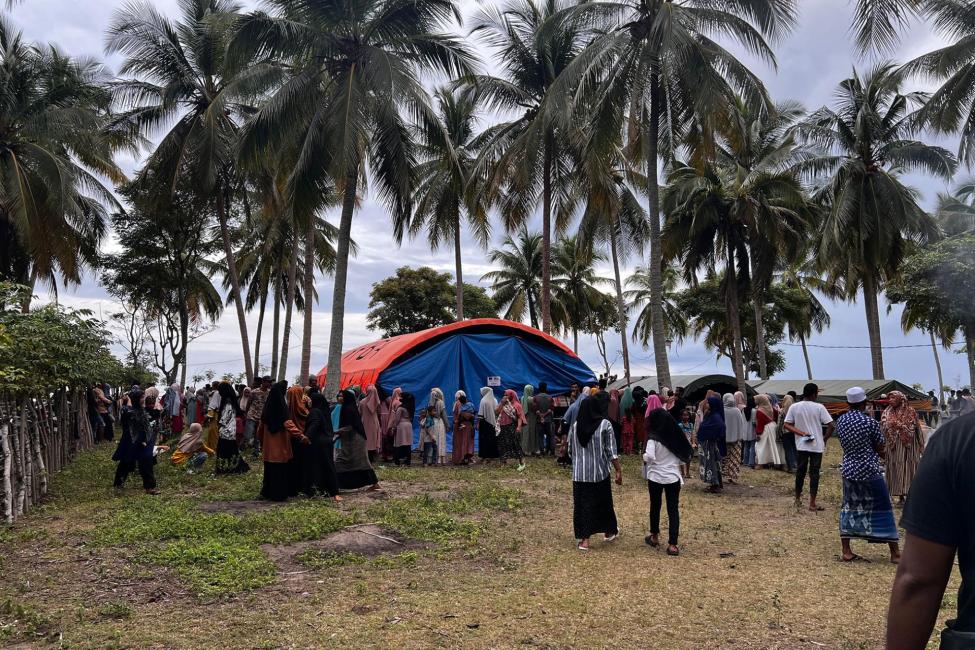-
Who we are
WHO WE AREThe International Organization for Migration (IOM) is part of the United Nations System as the leading inter-governmental organization promoting since 1951 humane and orderly migration for the benefit of all, with 175 member states and a presence in over 100 countries. IOM joined the United Nations system in September 2016.
About
About
IOM Global
IOM Global
-
Our Work
Our WorkAs the leading inter-governmental organization promoting humane and orderly migration, IOM plays a key role to support the achievement of the 2030 Agenda through different areas of intervention that connect both humanitarian assistance and sustainable development.
Cross-cutting (Global)
Cross-cutting (Global)
- Data and Resources
- Take Action
- 2030 Agenda
IOM-Microsoft Release the First Public Dataset on Victims and Perpetrators of Trafficking
Geneva/ New York – The International Organization for Migration (IOM) today released the first publicly available dataset linking the profiles of trafficking victims and perpetrators whilst preserving the anonymity and privacy of survivors. The dataset is made possible by state-of-the-art technology developed in partnership with Microsoft Research and provides first-hand information on the relationships between victims and perpetrators.
The nature of the victim-perpetrator relationships represents a valuable source of insight to better assist survivors and prosecute offenders. By making this information openly and safely available for the first time, IOM and Microsoft Research aim to share this technique with humanitarian actors worldwide to improve the production of privacy-preserving data and accelerate evidence-based policy in the fight against human trafficking.
The Global Victim-Perpetrator Synthetic Dataset is available on the Counter Trafficking Data Collaborative (CTDC) data hub – the first global data portal on human trafficking. This dataset includes IOM case data from over 17,000 victims and survivors of trafficking identified across 123 countries and territories, and their accounts of over 37,000 perpetrators who facilitated the trafficking process from 2005 to 2022.
“Making data on human trafficking widely available to stakeholders while protecting the safety and privacy of victims in a sustainable manner is crucial to developing evidence-based responses,” said Monica Goracci, IOM's Director of Programme Support and Migration Management. “IOM is delighted to work with Microsoft Research in overcoming the challenge of sharing administrative data for analysis.”
Since the 2019 Tech Against Trafficking Accelerator Program, IOM and Microsoft Research have worked together to develop and refine an approach to generate synthetic data from CTDC’s sensitive victim case records. The resulting synthetic case records accurately preserve the statistical properties of the original victim data without representing actual victims.
A new extension to this approach, which incorporates the gold standard of “differential privacy”, generates synthetic data with quantifiable privacy guarantees against any privacy attacks, even across multiple data releases. This approach promotes sustainable and long-term contributions to a shared evidence base in the collective fight against trafficking, making it possible to share more data and conduct more rigorous research while protecting privacy and civil liberties.
“At Microsoft, we believe everyone can benefit from collaborating around open data to make better decisions and tackle some of the world’s most pressing societal challenges,” said Darren Edge, Director at Microsoft Research and project lead. “By protecting the privacy and safety of victims with synthetic data, and empowering policymakers to view, explore, and make sense of data through rich interactive dashboards, we are illustrating one of the many ways in which research technology can help to coordinate and amplify the efforts of anti-trafficking organizations around the world – or any organizations working to tackle human rights issues using open data.”
The new privacy-preserving synthetic data solution, developed at Microsoft Research, is available as both open-source software and a free-to-use web application that enables creation of synthetic datasets interactively in the web browser. IOM is committed to ensuring the voices of victims and survivors are heard and protected while empowering governments and other stakeholders to take progressive action to end human trafficking. This includes releasing new standards for trafficking data and an accompanying toolkit for frontline organizations and indexing policy-oriented research on trafficking in a Bibliography.
The Global Victim-Perpetrator Synthetic Data and related resources can be accessed here.
***
For more information, please contact:
IOM:
Kennedy Okoth Email: kokoth@iom.int
Lorraine Wong, Email: lwong@iom.int
Microsoft:
Darren Edge, Email: darren.edge@microsoft.com
This initiative is supported by the Dutch Ministry of Foreign Affairs (MFA) through the COMPASS initiative and the United States Department of Labor (USDOL) through the International Labour Organization (ILO)’s Research to Action (RTA) project. The contents are the responsibility of the authors and do not necessarily reflect the views of Dutch MFA, ILO, or USDOL.

